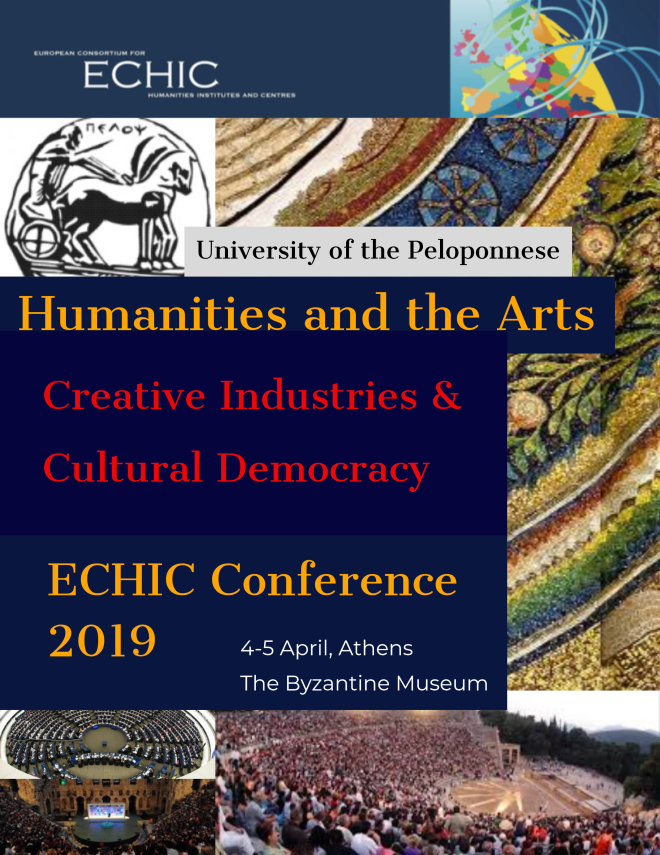
Creative industries and cultural democracy were the focus of the international conference ‘Humanities and the Arts, Creative Industries and Cultural Democracy’ of the European Consortium for Humanities Institutes and Centres (ECHIC) which took place in Athens on 4 and 5 April 2019 at the Byzantine Museum. The National Documentation Centre contributed with a presentation of its role in the Greek humanities ecosystem. Held in the wonderful setting of the Byzantine Museum, the conference was an excellent opportunity for fruitful dialogue and the exchange of views across disciplines.
ECHIC ( European Consortium for Humanities Institutes) is a university-based initiative for the networking of European Research Institutes, Humanities Faculties and Centres for the Humanities Dr Angeliki Spiropoulou, Associate Professor of European Literature and Theory, University of the Peloponnese; Research Fellow, School of Advanced Study-University of London and conference organiser welcomed conference attendees and urged them to effectively discuss how the relationship between creativity and democracy can be developed through the digital humanities.
The Minister of Culture and Sports Dr Myrsini Zorba stated that: ‘Cultural democracy is a fundamental term of reference, closely connected with political democracy. Democracy cannot develop within the limited and narrow political representation framework. Without cultural meanings, political life remains outside the perspective of life and human experience and therefore distant and indifferent to citizens. Thus, ‘parallel realities’ exist. The new social movements have brought to light this very distance, this cultural asymmetry, which overlaps with social inequality and cultural discrimination. This interpretation of cultural asymmetry and social inequality is what is at stake.’
The keynote speaker, Rick Rylance, Dean of the School of Advance Study, University of London, a research centre for the Humanities, talked about the humanities sector and its relationship with the creative industries. He stressed that scientists in this field must overcome the bias against it in relation to science, giving examples of countries where funding for humanities research is similar to that of science. Finally, he outlined the growth and dynamics of the creative industries in the UK, stressing that the sector is valued at 84 billion euros annually.
Several interesting panels discussed the various aspects of the conference theme. On the first day, they included: Cultural Policy and Cultural Democracy, Digital Humanities and the Arts and HERA-Humanities in the Research Area. Topics for panel discussion on the second day covered: Art & Society, the Creative Industries, Language Creativity and the Arts and Humanities and the Arts: Project Presentations.

The discussion on Digital Humanities and the Arts was opened by Elena Lagoudi representing the National Documentation Centre (EKT). She gave a presentation of EKT’s activities for digital humanities and the arts as well as the services it provides for researchers and organisations in the humanities and the growing scope for humanities research available in aggregation infrastructures, repositories and epublishing.
On the second day of the conference, creative industry issues in society were discussed with the keynote address referring to the Ego-Media Project, a five-year project funded by the European Research Council to assess the impact of digital and social media upon the practices and experiences of life writing and related modes of ego narrative.













